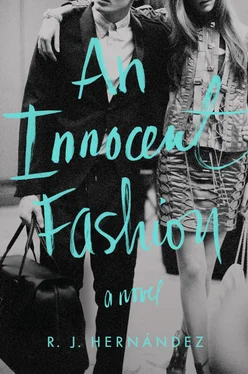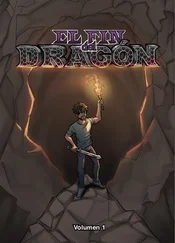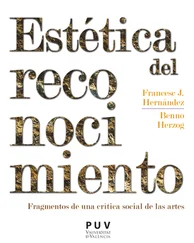My head raced through alternative interpretations of the words that had just left Sabrina’s mouth, but there was nothing to interpret: Sabrina had declared me ultimately unsuitable for Régine . It was a judgment overwhelming in its offensiveness, yet she appeared so calm, so lovely reclining there, as though she had merely commented on the weather.
In a kind of stupefied daze, I shook my head. “I’m sorry, but — did I somehow give you the impression that I’m unqualified for this?”
Upon detecting my indignation, Sabrina livened up. “I don’t mean to upset you,” she equivocated grandly, with an expression so deliberately innocuous as to acquit her of all malign intent. “But with these things, I think it’s important to be honest, don’t you? If I let you have certain expectations — for instance, that you stand a reasonable chance of becoming a fashion editor at Régine —well, that wouldn’t be very considerate of me, would it?” The corners of her mouth turned up, with the wistfulness of a weeping willow branch caught in the wind, and in a second, my latent suspicions of her malevolence were confirmed.
“But, I’m extremely qualified,” I protested. “I — my whole life I—”
Sabrina gestured lightly toward me. “Who makes your suit, Ethan? In that lovely color.”
“What?” My disorientation was complete. “I–I don’t know,” I replied. “It’s just. thrifted.”
She pressed her lips together and nodded. “Thrifted?” she repeated with a feigned ignorance, as though to spare me the dishonor of my own admission. “I’ve never heard of them.” Then she slipped a finger under her Chanel bracelet and rotated it so the charm with the diamond logo was facing up. “I’m guessing your shoes too—‘thrifted,’ right?”
I suddenly saw us from above, as a fly would see us if it was buzzing in a circle around our heads. I saw Sabrina’s bracelet and her ring, the alabaster gleam of her white-blonde hair, her arms arranged gracefully over her lap — her skin polished and smooth, like pale, lacquered wood. Then I saw myself as she must have seen me, as some kind of clown in my outdated suit from the Salvation Army — too colorful, uncouth — with my scuffed-up shoes, and my lop of curly brown hair. An outsider who didn’t know the language. She sat coolly back in the chair, as comfortable as if she was in her own home, while I. I was leaning forward like a bent antenna, my dignity betrayed by my total desperation.
“What did you say your parents do?”
This wasn’t her fault — I knew I had brought it on myself, all of it — but did she have to be so cruel? She somehow must have known. Over one shoulder, perhaps, she saw my mother, rotund and reeking of Clorox; over the other, my father, covered in curly black hair, his brown, sweaty stomach hanging over his belt. “I don’t know what that has to do with this,” I croaked.
“It has everything to do with this. Let’s put it this way. ” She began to balance her words like wooden blocks. “Have you ever tried to fit a piece of yarn through the eye of a needle?” She shrugged, and the tower teetered, then came crashing down. “It just. doesn’t work.”
Her casual suggestion that, of all things, I should consider myself a piece of yarn —a common, homespun twist of unsophisticated fibers, too coarse, too unrefined to ever fit in at Régine —swung through me like a wrecking ball. It was an evaluation she had made in less than ten minutes.
Her chewing gum made a sickly sound as she relegated it slowly to a crevice between her back molars and crushed down. “I’m sorry — I can see this isn’t going to happen,” she said. She pushed my résumé quietly toward me on the coffee table and stood up. Her pleated skirt rippled all around her, like a pond whose surface had been momentarily disturbed, and was now returning to untouched stillness. “We’ll be in touch.”
“I — what?” No. It couldn’t end like this, not after how far I’d already come. My dream was slipping away like life from a dying body, intravenous tubes dripping and a monitor above the bed blinking, TRAGEDY! TRAGEDY!
I fumbled to my feet behind her, knowing that if I didn’t stop Sabrina Walker, I was never going to hear from her again. My entire future hung in the balance of the next moment. We stood two feet away from each other. She smelled like a particular kind of smoker, the kind who tried unsuccessfully to temper the evidence of cigarettes with perfume and ended up smelling like a flower that had tumbled into an ashtray.
“Can I meet with Edmund himself?” I blurted.
She let out an incredulous guffaw. “Don’t be absurd! After Ava Burgess, Edmund Benneton is the most sought-after person at Régine , which makes him the second-most sought-after person in the fashion industry.” Then, in a tone that was, for the first time, not veiled with some calculated affectation: “Do you think he cares about an intern?!” She added offhandedly, with undisguised satisfaction, “I’m sorry, but try Teen Régine . I have work to do.”
My blood rushed to my head. “Look,” I demanded. “I have a great eye for beauty.” I took a step closer, with an avowal as futile as all famous last words—“ I belong here. ”
She exhaled toward the marble floor, like she was embarrassed on my behalf. “Ethan St. James, let’s keep this dignified, please . Do you think I have time to bother with you and your ‘great eye’? I’m sure your skills will be appreciated somewhere else.”
Striding to the glass doors, she turned around to reveal a row of tiny velvet buttons down her spine. As the heart monitor teetered on silence ( beep. beep. beep! ) I half-shouted, “I mean, really— Régine is a fashion magazine — how can it possibly be that hard?”
At this, Sabrina pivoted just her head, so that her chin was pointed over her shoulder. “You think working at Régine would be not — that — hard?” The corner of her eyebrow flickered, a crack in her otherwise self-assured countenance. “All right, Mr. St. James, with the ‘great eye,’ who went to Yale —” I felt the soul of my dying dream approach the final threshold, as Sabrina pressed her ID card against the reader— beep!
“Monday. Nine o’clock.” Without taking her eyes off me, she pressed her back against the Régine door, and with a final combative glare said, “Wear something deserving of your presumptuous sweat.”
If I had possessed a greater sense of self-awareness, or a lesser sense of self-importance, I might have appreciated the perfect irony of my interview — that Sabrina Walker considered me inferior to the standard at Régine , when for the past four years I had entertained a kind of superiority complex toward the world.
I hadn’t always been as confident as I was by the time I got to Yale. Despite my obsession with reading, or maybe because of it, I had been a terrible student throughout elementary and middle school; semester after semester spent suffering bossy, simpleminded teachers, who believed the height of knowledge was memorization and never had good answers to the important questions. There was no reason for me to think high school would be any better; based on the rumors, it promised to be much worse. Along with the rest of the incoming students, the course I dreaded most was Freshman English, taught by the infamous and decrepit Ms. Duncan, who was “too hard,” assigned too much homework, and failed more students than any other teacher. She ran her classroom like a ballet studio, in which the slightest flail at the barre was cause for ruthless admonition, and unlike the other “mean” teachers who redeemed themselves by selecting favorites, I’d never heard of anyone being spared by Ms. Duncan.
Читать дальше












